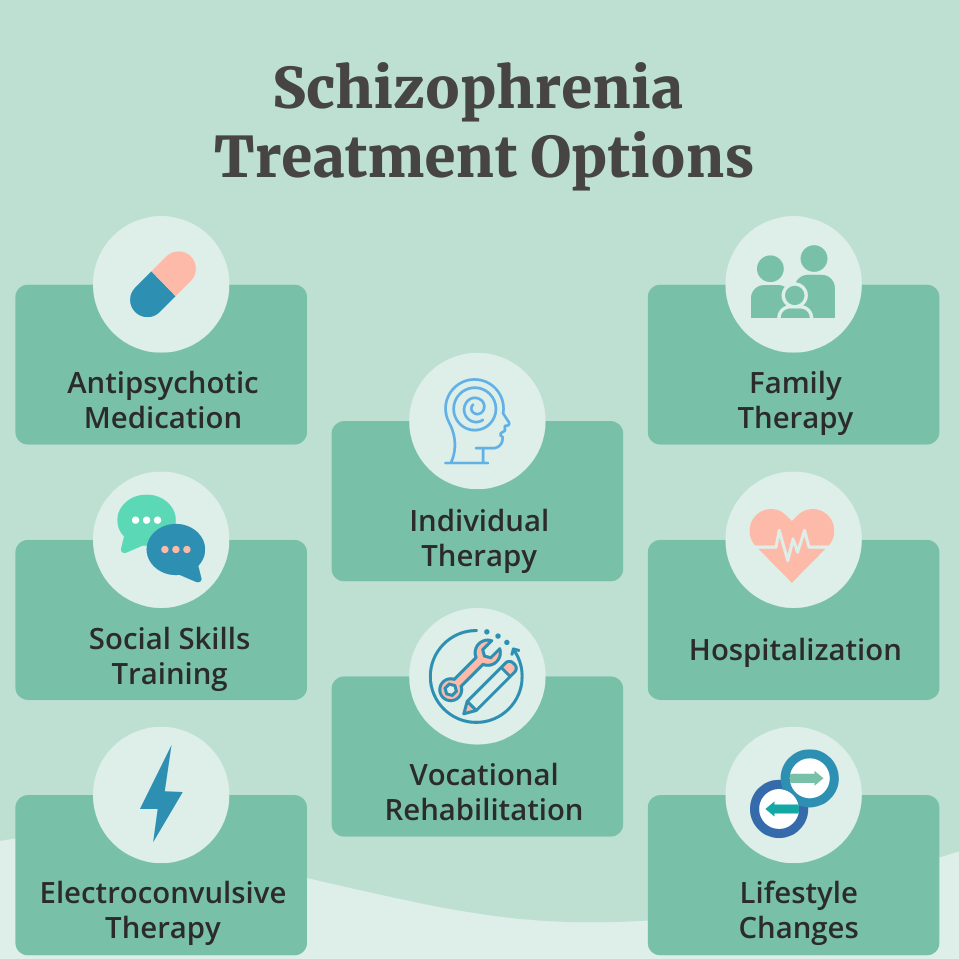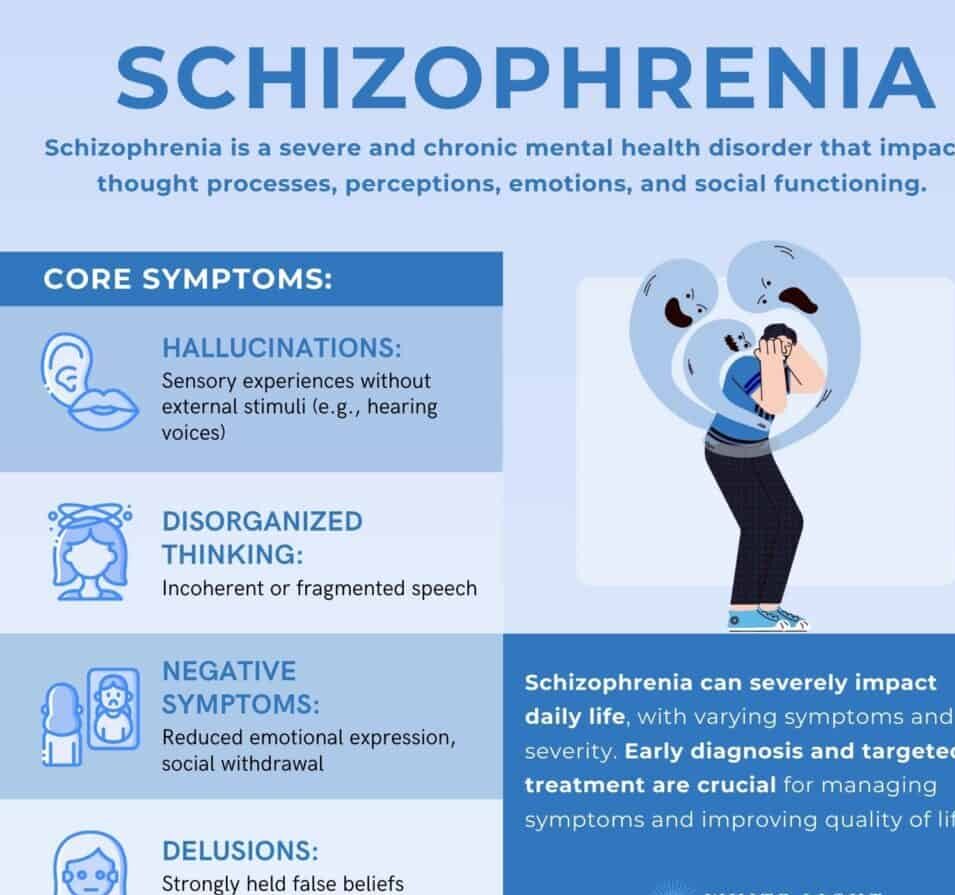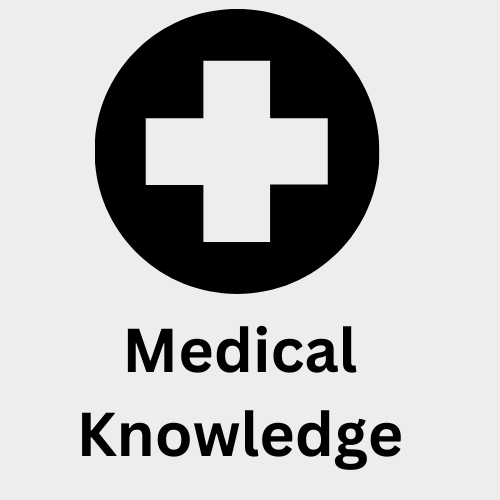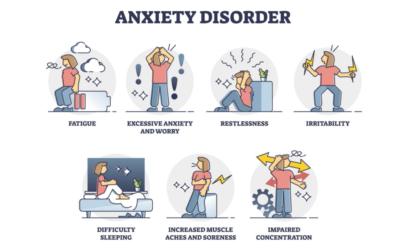Introduction to Schizophrenia
Schizophrenia is a serious mental disorder that affects a person’s thinking, emotions, and behavior. It is a chronic condition that can cause hallucinations, delusions, and cognitive impairment. Understanding schizophrenia is key to managing it effectively and improving the quality of life for those affected.

What is Schizophrenia?
Schizophrenia is a complex brain disorder that disrupts the way an individual perceives reality. It can cause severe changes in cognition, emotions, and social interactions. While it is a lifelong condition, proper treatment and support can help manage symptoms effectively.
Causes and Risk Factors
The exact cause of schizophrenia is unknown, but several factors contribute to its development, including:
- Genetics – A family history of schizophrenia increases the risk.
- Brain Chemistry and Structure – Abnormal levels of dopamine and structural changes in the brain may be linked to the disorder.
- Environmental Triggers – Factors such as prenatal infections, malnutrition, or exposure to toxins may increase susceptibility.
- Substance Use – Drug abuse, especially during adolescence, may trigger schizophrenia in individuals predisposed to the disorder.
Symptoms of Schizophrenia
Schizophrenia symptoms are categorized into three types:
1. Positive Symptoms (Psychotic Symptoms)
- Hallucinations (hearing voices, seeing things that are not there)
- Delusions (false beliefs not based on reality)
- Disorganized speech and thinking
- Agitation and unusual body movements
2. Negative Symptoms (Loss of Function)
- Lack of motivation or interest in activities
- Withdrawal from social interactions
- Reduced speech and emotional expression
- Difficulty in performing daily tasks
3. Cognitive Symptoms
- Trouble focusing or concentrating
- Impaired decision-making abilities
- Memory problems
Diagnosis and Tests
Schizophrenia is diagnosed based on a combination of clinical evaluations, including:
- Psychiatric Evaluation – Assessing symptoms, medical history, and family history.
- Medical Tests – Brain imaging (MRI, CT scans) and blood tests to rule out other conditions.
- DSM-5 Criteria – The Diagnostic and Statistical Manual of Mental Disorders (DSM-5) outlines specific criteria for diagnosing schizophrenia.
Treatment Options
There is no cure for schizophrenia, but various treatments help manage symptoms effectively:
1. Medications
- Antipsychotics – The primary treatment for schizophrenia, these help reduce hallucinations and delusions (e.g., Risperidone, Clozapine, Olanzapine).
- Mood Stabilizers and Antidepressants – Used in some cases to manage additional symptoms.
2. Therapy and Counseling
- Cognitive Behavioral Therapy (CBT) – Helps individuals manage hallucinations, delusions, and negative thought patterns.
- Family Therapy – Educates and supports families in dealing with a loved one’s condition.
- Social Skills Training – Helps improve communication and daily functioning.
3. Lifestyle and Support
- Regular Exercise and Healthy Diet – Physical health impacts mental well-being.
- Avoiding Substance Abuse – Reducing drug and alcohol use prevents worsening symptoms.
- Community Support and Rehabilitation – Support groups and vocational training help individuals reintegrate into society.

Coping and Management Strategies
Managing schizophrenia requires a combination of medical treatment and lifestyle modifications. Here are some effective coping strategies:
- Medication Adherence – Sticking to prescribed medication schedules to prevent relapse.
- Stress Management – Practicing relaxation techniques like meditation and deep breathing.
- Routine and Structure – Maintaining a daily schedule to reduce anxiety and confusion.
- Social Support – Engaging with family, friends, and support groups.
- Self-Care Practices – Prioritizing sleep, nutrition, and mental well-being.
Myths and Misconceptions
Schizophrenia is often misunderstood, leading to stigma. Let’s debunk some common myths:
- Myth: Schizophrenia means having a “split personality.”
- Fact: Schizophrenia is not the same as dissociative identity disorder (DID); it involves distorted thinking and perception.
- Myth: People with schizophrenia are violent.
- Fact: Most individuals with schizophrenia are not violent; they are more likely to be victims of violence.
- Myth: Schizophrenia cannot be treated.
- Fact: With medication and therapy, many individuals lead productive lives.
Conclusion
Schizophrenia is a complex but manageable disorder. Early diagnosis, proper treatment, and lifestyle adjustments can significantly improve an individual’s quality of life. By understanding the condition and supporting those affected, we can reduce stigma and promote mental well-being. If you or someone you know is struggling with schizophrenia, seek professional help for guidance and treatment.

